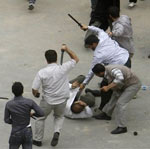 Reuters: Human rights activists in Iran are subjected to beatings with batons, mock hangings, rape, sleep deprivation, and threats that family members will be raped or killed, a U.N. rights investigator said in a report released on Thursday.
Reuters: Human rights activists in Iran are subjected to beatings with batons, mock hangings, rape, sleep deprivation, and threats that family members will be raped or killed, a U.N. rights investigator said in a report released on Thursday.
By Michelle Nichols
 UNITED NATIONS (Reuters) – Human rights activists in Iran are subjected to beatings with batons, mock hangings, rape, sleep deprivation, and threats that family members will be raped or killed, a U.N. rights investigator said in a report released on Thursday.
UNITED NATIONS (Reuters) – Human rights activists in Iran are subjected to beatings with batons, mock hangings, rape, sleep deprivation, and threats that family members will be raped or killed, a U.N. rights investigator said in a report released on Thursday.
The U.N. special rapporteur on human rights in Iran, Ahmed Shaheed, said in a report to the U.N. General Assembly that Iranian authorities undermined press freedoms, watched some journalists constantly and detained and persecuted others unfairly.
“The authorities recently banned domestic news outlets from reporting on the impact of economic sanctions imposed on the Islamic Republic of Iran,” Shaheed said.
The Iranian currency has plunged in the past few weeks, sparking street protests. Officials from the United States and other Western countries blame the drop on a combination of economic mismanagement and sanctions.
Iran is under U.N., U.S. and European Union sanctions for refusing to halt nuclear enrichment, which Western powers and their allies say is part of a plan to amass the capability to produce nuclear weapons. Tehran denies the charge, saying its atomic work is for medicine and generating electricity.
Shaheed said Iranian authorities executed at least 223 people in the first six months of this year, most of them for drug-related offenses. A large number of those executed were convicted at unfair trials.
About 670 people were executed in Iran in 2011, according to Shaheed.
The report provides “a deeply troubling picture of the overall human rights situation in the Islamic Republic of Iran, including many concerns which are systemic in nature,” he said.
Shaheed, a former foreign minister of Maldives, said the Iranian government had not allowed him to visit Iran while making his assessment, but that he had interviewed 99 people, of which three-quarters gave first-hand accounts and the rest were reliable sources or eyewitnesses.
WOMEN WORTH LESS THAN MEN
“In two dozen interviews … human rights defenders reported being arrested and held incommunicado in solitary confinement for periods ranging from several weeks to 36 months, without charge or access to legal counsel,” Shaheed said.
“Most of them also reported that they were subjected to severe physical torture during interrogations, which were aimed at coercing confessions or soliciting information about other human rights defenders and human rights organizations,” he said.
The report said: “Methods employed reportedly included severe beatings with batons and other objects, mock hangings, electrocution, and actual rape.
“Other forms of psychological torture allegedly included sleep deprivation, denial of food and/or water, and threats of arrest, detention, rape or murder of family members. Several victims also reported being drugged with hallucinogens.”
Iran ratified the International Covenant on Civil and Political Rights in 1975 – four years before an Islamic revolution ushered in a clergy-led government that said it took its guidance from Islamic scriptures.
The report said Iran has maintained that the constitution of the Islamic Republic guarantees freedom of expression, religion, assembly and association. Tehran dismisses criticism of its human rights record.
Iran’s U.N. mission did not respond immediately to a request for a reaction to Shaheed’s report.
Shaheed said Iran’s Islamic Penal Code contravenes international law because a woman’s court testimony and her life is valued at half that of a man’s. Girls are recognized as legally culpable at 9 years old and boys at 14.
He said the penal code also deems moharebeh (enmity against God) and fisad-fil-arzz (corruption on earth) as capital crimes, punishable by execution, crucifixion, amputation of the right hand and the left foot, or banishment.
“A number of interviews conducted and reports received by the special rapporteur show that individuals arrested for political and human rights-related activities are often charged with moharebeh and fisad-fil-arzz,” Shaheed said.
(Editing by Mohammad Zargham)


